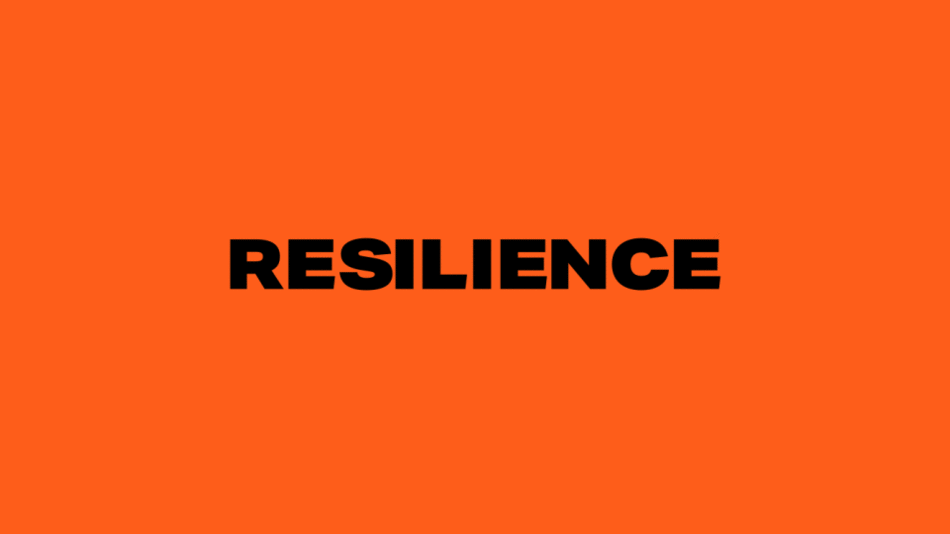The art of bouncing back
Working as a creative requires a very thick skin.
Your work will be judged, critiqued, and rejected. It comes with the territory.
Sometimes it will be justified, sometimes it won’t. Either way, you can’t let it stop you from moving on.
As Rocky Balboa famously said:
“It aint about how hard you hit. It's about how hard you can get hit and keep moving forward.”
That being said, coming up with ideas only to be told they don’t hit the mark can be draining over time.
The ability to repeatedly bounce back requires resilience. Some people have more of this than others.
It is also something you can build up with experience. But even then, the most seasoned creatives can still be affected.
I feel like my resilience was given a good head start.
I grew up in an environment that was fraught with conflict between my parents. They shouted, argued, and threw things. That’s scary stuff when you’re a little kid.
It wasn’t every day. But it was regular enough to be considered not unusual. It always happened in the evenings, you never saw it coming. There would be no reference to them the next day. It was like it never happened.
We lived in a small maisonette. I shared a bedroom. There was no privacy. I used my imagination to escape, I could block it all out and draw for hours; I’d found a coping mechanism.
By the time I’d hit my teens, the outbursts hadn’t stopped. They were never physical, sometimes even comical, and while they were still fundamentally unpleasant, if I relayed them to people, I could often see the funny side. I won’t go into specifics, but if you imagine the TV show Shameless, you wouldn’t be far off.
Humour: was another coping mechanism.
This was a 1970-80s council estate in the midlands and not an uncommon family dynamic. But I’m convinced that being exposed to it, and using those coping mechanisms to block out and laugh it off were good tools to have as a professional creative.
The downside to these coping mechanisms is, that while being great for personal resilience, they are not so good for growing as a creative or leading a team.
Blocking out what you don’t want to hear means you might miss things that you NEED to hear.
Laughing off something that should be taken seriously lacks empathy, you need to see things from other people’s perspectives.
You need to listen and adapt. Ignore these and there’s a danger of your ego creeping in.
So what’s the best approach? For me, it’s simply being comfortable with exposing myself. (fnar fnar).
Sniggering aside, what I mean is the ability to show vulnerability. To admit when things aren’t working. To ask for help from your team. To trust them to make to the right decision. To make them feel safe to do the same.
Some of the funniest people I’ve met have worked in creative departments. That magical combination of observation, speed, and creativity often partnered with an un-offendable mindset more akin to a comedy writer’s room is a magical thing to be around.
I’ve had so many days at work where I’ve almost fallen to the floor laughing. It’s a privilege.
If you can show that it’s OK to be vulnerable, then you are more likely to create an environment where the team will support each other instinctively, reach a goal together, and be happy.
The problem is, that a lot of creatives are afraid to show vulnerability seeing it as a sign of weakness. Particularly those in leadership roles, who can unnecessarily micro-manage and allow their egos to take control.
Working with these people can lead to a loss of confidence in your own abilities. And if exposed for long periods of time can be seriously harmful. Recognising it can be hard, and addressing it can be even harder.
If you take into account the nature of the industry and all the rejections it brings, alongside potential toxic colleagues, building resilience can be a struggle.
Much of that can be beyond your control, but how you deal with it can be owned by you, and that is why I would advise working with a coach.
My wife has been working in the creative industry for longer than I have (over thirty years). She’s worked alongside the good, the bad, and the ugly, plus ran her own design business for the past twenty years. She knows a lot about people and the barriers that can be stopping them from being their best selves.
Having been someone who was regularly asked for advice (and enjoyed giving it), she decided to offer coaching for creatives in an official capacity. For the last few years, she has added to her wealth of experience, a selection of techniques that can help improve the confidence and motivation of those who are feeling a little lost.
She’s helped agency owners, managers, creatives (both in-house and agency side), and freelancers make sense when they feel they need to make a change. If you think that you could benefit from speaking to Vicki, feel free to get in touch by visiting vickilovegrove.co.uk

